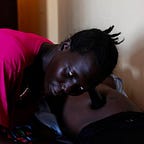Ganyiel PHCC: “health care in a time of crisis”
One month ago, 15 year old Carbino Lunjok had the first ever hernia operation in the new operating theatre in Ganyiel, a remote town in Panyijiar county, South Sudan.
The intense and constant pain Carbino experienced from the hernia made it too painful to help out at home or do any physical activity like other boys his age.
But since the operation, he said, smiling at his friend Gatkuoth, “Now I am free.”
The operating theatre, the first in the history of the county, was built under the Health Pooled Fund (HPF) and serves both the reproductive health unit and the neighbouring primary health care centre (PHCC), both also funded by HPF.
“The only funding for health care in greater Ganyiel comes from HPF, implemented through local partner IRC,” said Panyijiar county health department (CHD) director, Steven Gatliach Kuay. “There are no other partners providing support in this area.”
The PHCC here treats not only the people of greater Ganyiel but also a large number of internally displaced people (IDPs) who have sought refuge in the handful of habitable islands that lie in the nearby Sudd — one of the world’s largest swamplands.
During the wet season Ganyiel becomes landlocked providing a relative safe haven for thousands of South Sudanese Nuer who fled attacks on their villages further north.
Thoanum Island, reached by canoe from Ganyiel, is home to about 10,000 IDPs who have largely integrated into the host community. But with no permanent health facilities on the island, the residents must wait for outreaches or make the journey into Ganyiel.
The clinical officer in Ganyiel’s outpatient department sees about 300 people per day. The doctor reviews in-patients, sees referrals and also performs surgeries like Carbino’s in the new operating theatre at the nearby CEmONC* centre.
Nyantik Chung, already a mother of seven children, gave birth to triplets at the Ganyiel health facility six weeks ago.
It was Nyantik’s first time to give birth at a health facility. She was advised by a midwife at her first antenatal check-up that she was having triplets and should deliver at the PHCC in case of complications.
“I live one hour by foot from here,” she said. “When I went into labour I walked here but it took me two hours because I was so big and so slow.”
Nyantik said she is happy that she listened to the midwife’s advice.
“It was good that I came here to deliver because the second triplet was a breach birth, that’s why he is called Bachok; it means legs first.”
Nyantik and the triplets were supported in the stabilisation centre at the facility for one month after they were born as Nyantik didn’t have enough breast milk to feed them.
“Two weeks after we went home all three babies became sick with diarrhoea and vomiting. They couldn’t feed and became very weak. Bachok was the worst; I was worried for his life, so we came back here yesterday for help.”
Bachok, his brother, Both and sister, Nyadiet were all treated for severe dehydration and have responded well to treatment. Dr Hassan is happy with their progress and will discharge them when he is satisfied that they are well enough to leave.
“Today the triplets are much more stable but we will not go straight home. We will stay with relatives nearby so that we can return quickly if they become sick again.”
“I am so grateful for this health facility. Without it I do not know how we would survive,” said Nyantik.
Panyijiar county commissioner, John Tap Puot echoed Nyantik’s sentiments.
“We are very lucky to have healthcare here in a time of crisis,” he said. “All the community here — the old and the young — is happy for the assistance of HPF and its donors.”
*CEmONC — comprehensive emergency obstetric and newborn care
HPF is funded by the governments of the United Kingdom, Australia, Canada, Sweden and the European Union.
